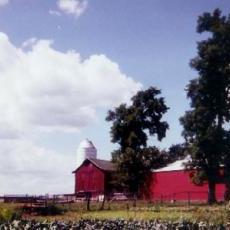






Most professors assign books or essays to students who want to earn extra credit. Jack Kloppenburg, a professor in UW-Madison’s community and environmental sociology department, takes a slightly different approach.
Students in Kloppenburg’s introductory environmental studies class can receive extra credit by volunteering on local farms, where they plant crops, harvest produce and perform other chores. © scotchhillfarm.comThe goal of these events, which are called “farm mobbings,” is to introduce students to locally grown produce and teach them about sustainable agricultural practices. Equally important is supporting small Wisconsin farms, some of which are still suffering from the recession and need extra help.
© scotchhillfarm.comThe goal of these events, which are called “farm mobbings,” is to introduce students to locally grown produce and teach them about sustainable agricultural practices. Equally important is supporting small Wisconsin farms, some of which are still suffering from the recession and need extra help.
“If you get 15 volunteers working for six hours, that’s equivalent to 90 hours of work and two weeks of labor on tough jobs,” Kloppenburg said. “Labor that would otherwise take two people 45 hours each.”
On a chilly Saturday morning in late March, about 20 volunteers gathered at Scotch Hill Farm in Brodhead, Wis., 30 miles south of Madison. Their task: to disassemble a hoop house (or greenhouse), move it about 45 feet and rebuild it in a new spot.
The hoop house was newly built—the farm’s owners, Tony and Dela Ends, erected it in September—and the structure had been previously approved by a building inspector, according to Dela. But recently the Endses learned that they would have to move the hoop house, due to zoning laws.
The Endses tried to appeal, arguing that the structure was only temporary, but they were turned down by Rock County Court. The deadline for the task was set for the end of April; after that, they would be charged $50 per day.
The ultimatum turned out to be a blessing in disguise. Dela says she and her husband “were going to move [the hoop house] anyways in a few years for crop rotation,” adding that the new location will be better for the kale, carrots and spinach they grow during winter. (Hoop houses, so-called for their flexible, hoop-like support poles, protect winter crops from harsh weather.)
Better for the crops is one thing, but doing the actual moving is tough work. The hoop house is roughly 150 by 30 feet, and everything had to be taken apart and then reassembled. Many volunteers spent much of the day on their hands and knees, removing nails and screws, prying up baseboards with crow bars and pulling poles from their moorings.
Lifting the structure from the ground presented the biggest obstacle to the volunteer crew. All the participants had to coordinate weight and timing together, and even when that worked some of the poles remained stuck in the ground.
“It was hard because not everyone in the group is equally strong,” said Alex Bohan, a UW-Madison junior and student in Kloppenburg’s class. “When some of the poles got stuck it required the strongest people to let go of their weight and run around to quickly fix the problem.”
Tony and Dela Ends stood on the sidelines, offering instructions. Their primary concern, however, was preparing the new land, replanting crops and re-erecting the hoop house. Preserving the hoop house crops is vital for business, since it takes nearly all winter to prepare crops for the spring and summer season.
The farm has also been hit hard by the recession. The Endses participate in CSA, or community-supported agriculture, meaning they sell shares of produce to customers. Dela also sells handmade organic soap. Sales of CSA shares and soap are down 30 percent from last year, and with a decrease in customers, the Endses are starting to worry.
“Farming is a gamble of a business… [and] it is backbreaking work running a farm,” Dela said. “We really do value volunteers.”
The volunteers from UW-Madison finished disassembling the hoop house after working for eight hours in blowing snow. As the day passed and the temperature continued to dip, however, the Endses decided to postpone moving the hoop house and replanting the crops until the following weekend. As a final thank-you, they cooked a hot meal for the volunteers.
The farm already has 50 to 60 more volunteers lined up for next weekend’s “mobbing.” Bohan said he’s looking forward to returning to finish the job.
“A lot of the people weren’t even doing it for extra credit, but because they wanted to help,” he said. “It’s going to feel so good when we get the structure rebuilt. I can’t wait to see the final product and eat awesome food.”
|
|
|
Welcome to the Madison Commons, a website designed to provide news and information about all of Madison's neighborhoods and a crossroads for the discussion of community issues. The name comes from the idea of a village commons, a place for news, talk, debate, and some entertainment, too, that's open to everyone.
All rights reserved. Read more about the Madison Commons and its partners.

